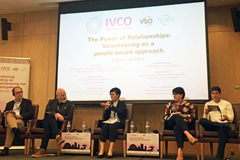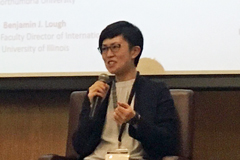Impact of Volunteer Activities Presented at the 2019 International Volunteer Cooperation Organisations' Conference
2019.11.18
The 2019 International Volunteer Cooperation Organisations’ Conference (IVCO) was held in Kigali, the capital of Rwanda, from Oct. 27 to 30, 2019. JICA Research Institute (JICA-RI) Research Fellow Mayuko Onuki and staff member Saori Yamamoto participated in the event.

Research Fellow Mayuko Onuki participated in a panel discussion
IVCO is a conference hosted once a year by the International Forum for Volunteering in Development, where international volunteer groups, government institutions and the private sector from around the world, gather to share knowledge and case studies. The 2019 conference, held in the African region for the first time, has the theme of “Advancing Quality in Volunteering for Development.” Approximately 250 people from 48 countries participated in a variety of sessions to discuss the theme.
On the 29th, a variety of dialog sessions took place based on the sub-theme “Volunteering Models: Innovation and Good Practice.” Onuki took the stage for one of these sessions, a panel discussion titled “The Power of Relationships: Volunteering as a People-Based Approach”. This discussion, which also involved Cheryl Johnson from the Australian government, Professor Matt Baillie Smith from Northumbria University in England, Jean-Daniel Balme from France Volontaires, and Professor Benjamin J. Lough from the University of Illinois in the U.S., focused on the way in which volunteers build relationships with the communities where they act, and how that has contributed to sustainable development.
Onuki presented the results of a JICA-RI research project, “Contributions of International Volunteers in Bringing Change to Developing Countries and Shaping a Global Civil Society”. This research project has been analyzing the activities carried out by the Japan Overseas Cooperation Volunteers (JOCVs) in host countries and the role that JOCVs play. Onuki, together with JICA-RI Visiting Fellow Yasunobu Okabe, who is a professor at Tohoku University, analyzed panel data collected from JOCVs to measure three types of social capital (bonding, bridging and linking) formed during their 2-year volunteering service, and examined their relationships with various kinds of volunteer outcomes such as counterpart’s service expansion, attitude change and budget increase. The study indicated that the most important type of social capital is the relationship with local counterparts (bonding social capital). She mentioned the role of JICA’s overseas offices and then explained how building relationships with local counterparts, such as bosses and colleagues, contributes to the achievements of volunteer activities.

Onuki says that the most important type of social capital formed during JOCV's volunteering service is the relationship with local counterparts
Onuki later said “Participation in IVCO has been a beneficial opportunity for providing information from Japan and sharing issues targeted at sustainable development with international volunteer project members from different countries.”

事業事前評価表(地球規模課題対応国際科学技術協力(SATREPS)).国際協力機構 地球環境部 . 防災第一チーム. 1.案件名.国 名: フィリピン共和国.

事業事前評価表(地球規模課題対応国際科学技術協力(SATREPS)).国際協力機構 地球環境部 . 防災第一チーム. 1.案件名.国 名: フィリピン共和国.

事業事前評価表(地球規模課題対応国際科学技術協力(SATREPS)).国際協力機構 地球環境部 . 防災第一チーム. 1.案件名.国 名: フィリピン共和国.

事業事前評価表(地球規模課題対応国際科学技術協力(SATREPS)).国際協力機構 地球環境部 . 防災第一チーム. 1.案件名.国 名: フィリピン共和国.

事業事前評価表(地球規模課題対応国際科学技術協力(SATREPS)).国際協力機構 地球環境部 . 防災第一チーム. 1.案件名.国 名: フィリピン共和国.
scroll